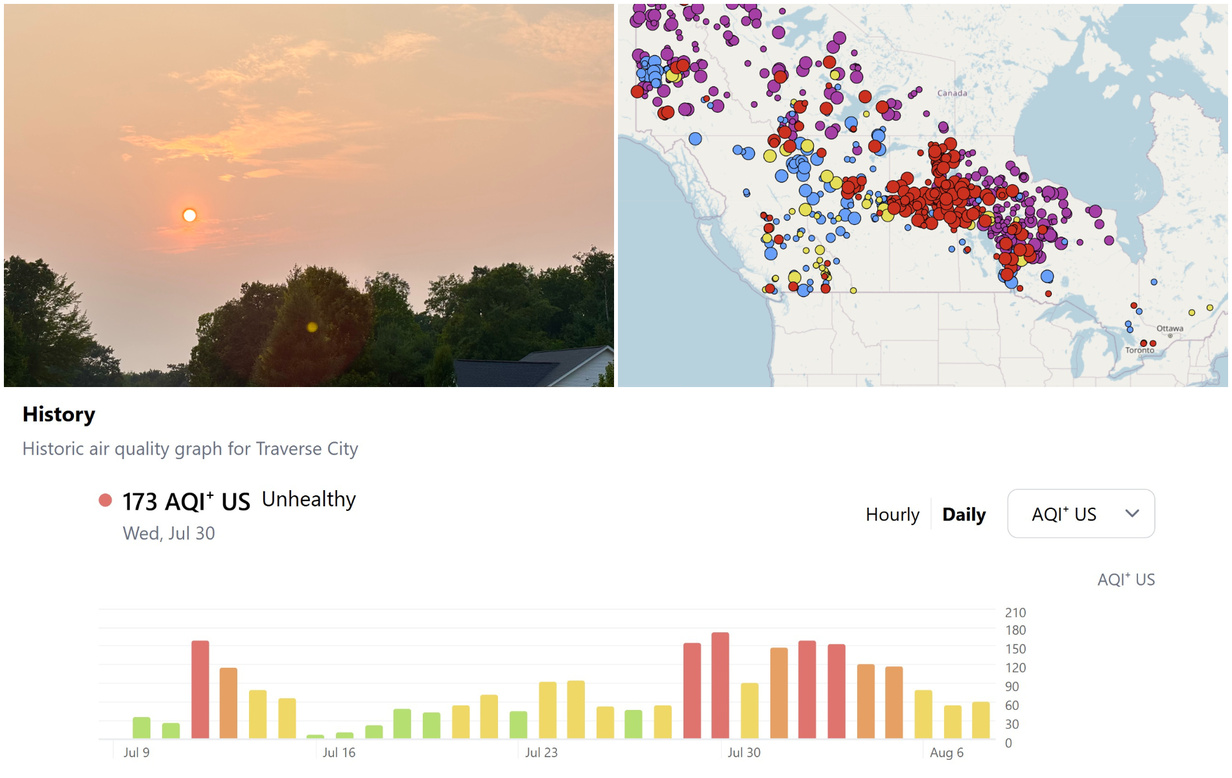
The Air Quality Problem: How Wildfire Smoke Is Contributing To A Busy Summer For Munson Healthcare
By Craig Manning | Aug. 10, 2025
It's been a busy summer at Munson Medical Center (MMC) in Traverse City, with hospital leaders pointing to everything from increased tourism volumes to the area’s aging population to explain recent record-breaking weeks for both the MMC emergency department and the hospital’s general inpatient census. The past 10 days, though, have underlined another potential contributing factor: a summer of dismal air quality throughout the Midwest.
While Traverse Citians this weekend are enjoying relatively normal summer weather, the region just escaped one of its longest sustained air quality advisories on record. For eight consecutive days, from Tuesday, July 29 through Tuesday, August 5, Traverse City contended with Air Quality Index (AQI) numbers in or near unhealthy ranges. For reference, AQI is the scale the United States Environmental Protection Agency uses to indicate levels of air pollution – and therefore, health concerns for those breathing that air – in any given location and at any given time.
Historically, Traverse City’s air quality has landed in the 0-50 section of the AQI scale, which indicates good air quality with little to no health risk. During the eight-day stretch identified above, though, Traverse City’s lowest daily average for AQI came on Thursday, July 31, when the scale clocked in at 91. The other seven days all saw AQI numbers of 100 or higher, with four of those days exceeding 150. Anything above 100 is considered to be “unhealthy for sensitive groups,” while anything above 150 is considered “unhealthy” for anyone.
According to Dr. Melanie Holtrop, a pulmonologist at Munson Healthcare Pulmonary & Critical Care of Northwest Michigan, the sustained stretch of bad air has manifested in an uptick in patient presentations.
“When the AQI starts to get above 100, that’s when we start to really worry, particularly about patients with respiratory vulnerabilities – so, COPD (Chronic Obstructive Pulmonary Disease), asthma, pulmonary fibrosis, that sort of thing,” Holtrop says. “Anecdotally, we've definitely seen a lot of people in the pulmonary clinic calling in or coming in for their appointments and saying, ‘Yeah, I'm having more breathing issues, or my eyes are watering, or this or that.’”
As more patients are presenting for respiratory issues, Holtrop also sees locals trying to adjust to what could be a new normal in northern Michigan: a summertime wildfire season.
“I would definitely say more people are coming into the clinic saying, ‘Yep, it's the wildfires. Everything's been bad [with my symptoms] since the wildfires,’” Holtrop tells The Ticker. That level of awareness of air quality and its negative side effects, she says, is stark, considering that northern Michigan hasn’t historically had these kinds of problems. “Until recently, wildfire smoke was always something that we thought of more as being a problem out west,” she adds. “I don't think we really thought about it much here in northern Michigan. Summer was always good outdoor time.”
On balance, bad air quality summers remain an anomaly in Traverse City. But one of the reasons for all the awareness around wildfire smoke lately stems from the fact that Michigan had a summer like this one just two years ago.
According to a 2023 air quality report from the Michigan Department of Environment, Great Lakes, and Energy (EGLE), Traverse City had 16 “Action! Days” declared in the summer of that year. EGLE issues those declarations on days “when meteorological conditions are conducive for the formation of elevated ground-level ozone or particulate matter concentrations.” Michiganders are then asked to do their part in reducing air pollution “by limiting vehicle use, refueling only after 6pm, carpooling, walking, biking, or taking public transit, deferring the use of gasoline-powered lawn and recreation equipment, limiting the use of volatile chemicals, and curtailing all burning.” For comparison, there were zero EGLE Action! Days declared for Traverse City in 2022, and just two apiece in 2021 and 2020.
The main culprit behind all those summer 2023 air advisory days? PM2.5, or particulate matter smaller than 2.5 microns in diameter. Per EGLE, Michigan “experienced unprecedented levels of PM2.5 due to Canadian wildfires” in the summer of 2023, with many areas of the state tallying “unhealthy levels of PM2.5 during several multi-day heavy smoke events.”
The same thing is happening in 2025, with wildfires in Canada putting massive amounts of particulate matter into the air, and that air making its way to Michigan any time the wind blows in a certain direction. According to the Canadian Interagency Forest Fire Centre, there are currently over 700 active fires burning in Canada, many of them along a northwesterly line that stretches from Yukon and the Northwest Territories in northern Canada to Saskatchewan and Manitoba in southern Canada. When the wind blows along that line, the smoky air blankets Michigan, along with other parts of the Midwest. Big cities, which tend to have higher air pollution by default, get hit the hardest during these periods, with both Chicago and Detroit recording some of the worst air quality on the planet in recent weeks.
With the problem likely to be recurrent throughout the remainder of the summer, and perhaps in future years, Holtrop is urging patients and other community members in Traverse City to get in the habit of monitoring AQI – and to adjust their habits and activities accordingly.
“When the AQI gets above 100, even if you’re someone without those respiratory or cardiovascular vulnerabilities, you may want to consider limiting the amount of time that you're outside,” Holtrop says. “So, instead of going for a 12-mile run, you might want to limit it to two or three miles on those days. I’d also advise trying to target the early mornings or late evenings [for outdoor exercise], when the air quality tends to be a little bit better. Once you get to an AQI of 150, though, everyone should really consider limiting their time outside and limiting their outdoor exercise.”
Pictured: Top left, a hazy sunset in Traverse City, photographed on Monday, August 4; top right, a map of currently-burning Canadian wildfires, courtesy of the Canadian Interagency Forest Fire Centre; bottom, a graph of the past month of daily AQI averages in Traverse City, courtesy of IQAir.
Comment






